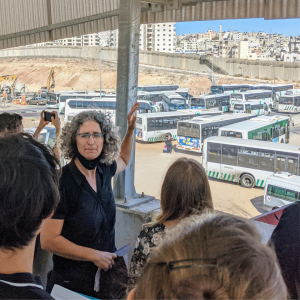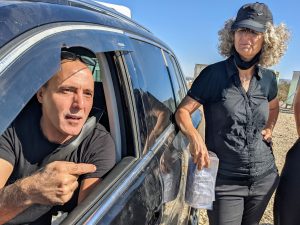On Tuesday, November 9th, I joined the first West Bank settlement tour organized by Peace Now since the onset of
the COVID-19 pandemic. Co-sponsored by the Geneva Initiative, it was organized for diplomats stationed in Israel
and it attracted some twenty diplomats from foreign embassies and consulates.
These settlement tours are a staple of APN’s annual study tours to Israel and the West Bank. Having organized the
study tours for almost fifteen years, I knew the route and recognized the storyline of the tour guide, Peace Now's
Settlement Watch Co-Director, Hagit Ofran.

But despite the familiarity, every time I join one of Hagit's tours I learn something new. Every time, I am
devastated by the depth of the de facto annexation process caused by the settlements and their disastrous impact on
future prospects for achieving Israeli-Palestinian peace.
I flagged a taxi in West Jerusalem to get to the Qalandia checkpoint on the northeastern outskirts of Jerusalem,
where the tour started.
The driver, Bassam, is an East Jerusalemite who previously worked with international media outlets in Jerusalem,
first as a delivery man and later as a sound technician. We swapped stories about colleagues and stories we
covered.
Bassam covered several rounds of Israeli-Palestinian negotiations. Old enough to remember the euphoria of the Oslo
Agreement and Yasser Arafat’s arrival in Palestine, he said he used to staunchly support the peace process. For
years, as he saw the foundations for a Palestinian state being laid, he was filled with hope.
But that hope has been crushed, he said, by Israel’s continued occupation and settlement growth, and by the
Palestinian Authority’s compliance and corruption. There is no hope for independence and statehood, he said,
"neither from Israel nor from the Palestinian Authority."
Today, Palestinians are merely surviving, he said. I told him about a Palestinian colloquial saying that I learned during the first intifada. It roughly translates to “we are living in the absence of death.” He smiled and said that this saying captures the way Palestinians feel about life in times of active conflict. Now, he said, the situation is more like “we are surviving in the absence of a meaningful life."
The tour started with Hagit showing the route of a tunnel that would underpass the Qalandia checkpoint to allow West Bank Israeli setters a quick drive to Israel and back into the West Bank without being bothered by traffic lights or Palestinians. Another measure of de facto annexation.
As we traveled north, passing old and new settlements, including several illegal outposts, Peace Now’s Director of External Relations Dana Mills took the microphone and told the group, “Here’s the only good news you’ll hear today: I am going to hand you some sandwiches.” Some of the diplomats seemed overwhelmed by what they saw and heard, such as the saga of Migron, an illegal outpost that started out as a cellular antenna and grew into a settlement community built on privately owned Palestinian land. Peace Now helped the Palestinian owners file a lawsuit. When the court finally ordered Migron’s removal, the government compensated the settlers with a new settlement at a nearby location.
Hagit explained why many of the new illegal outposts in the West Bank are agricultural farms. These farms, typically inhabited by a handful of settlers, can take over vast areas of grazing land to deny Palestinians’ access to it. Many of the recent clashes in the West Bank are a result of settlers from agricultural farms denying Palestinians’ access to land they have cultivated for generations.
On a hill overlooking just such a new agricultural illegal outpost, the diplomats met with two Palestinian activists from nearby farming communities. One of them, Issa Souf of the village of Hares, pleaded with his audience to report back to their governments. “The international community must act,” he said.
The last stop was the Eshel Hashomron hotel in the large settlement of Ariel, which features both a biblical park and a shooting range on the hotel premises. These make it a popular attraction among right-wing Israelis and American evangelicals.
Before ending the tour, Hagit and her colleagues emphasized that although Palestinians feel hopeless, there is hope for a future breakthrough leading to the creation of a Palestinian state next to Israel. It’s a viable solution, and keeping the path open for such a solution is imperative. But it requires strong partnership between Israel’s peace camp and international supporters of Israeli-Palestinian peace. Hagit won applause from the diplomats for the tour. As they left for their Tel Aviv embassies with Peace Now’s West Bank maps in hand, they asked for contact info and further resources.
Hagit and I hopped on the fast train to Jerusalem. Hagit was concerned. She told me that the settlers also offer tours. Theirs are similar. They take people, including diplomats, to the same places. They just tell a very different story. We, Hagit said, must make sure we do a better job and tell a better story. I couldn’t tell if she was sarcastically smiling under her mask.

By Ori Nir, VP for Public Affairs